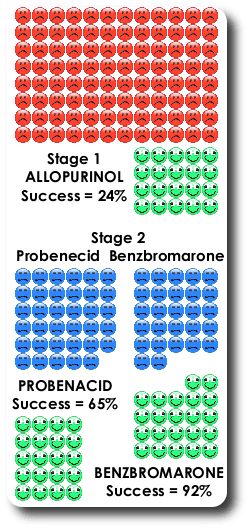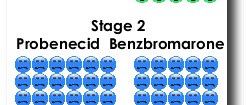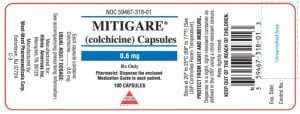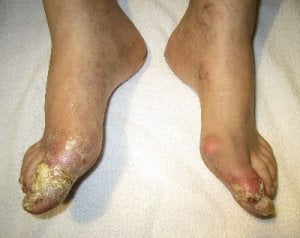New research indicates that probenecid is almost 3 times better than allopurinol.
Benzbromarone is almost 4 times better. Please note that benzbromarone is restricted in many countries due to concerns about effects on the liver.
Allopurinol vs Probenecid Research
Medline abstract:
2008 Apr 23 [Epub ahead of print]
Efficacy and tolerability of urate lowering drugs in gout: a randomised controlled trial of benzbromarone versus probenecid after failure of allopurinol.
Reinders MK, van Roon EN, Jansen TL, Delsing J, Griep EN, Hoekstra M, van de Laar MA, Brouwers JR.
Department of Pharmacotherapy and Pharmaceutical Care, University of Groningen, Groningen, Netherlands.
- OBJECTIVES:
- To investigate the efficacy and tolerability of allopurinol as first-choice uric acid lowering (antihyperuricemic) treatment for gout, and compare the efficacy and tolerability of benzbromarone and probenecid as second-choice treatment.
- METHODS:
- Prospective, multi-center, open-label, randomized controlled trial (RCT) of gout patients with normal kidney function.
Patients were given 300 mg allopurinol for 2 months (stage 1).
When allopurinol was not tolerated or failed to attain target serum urate concentrations (sUr)
- RESULTS:
- Ninety-six patients were enrolled in stage 1.
Eighty-two patients (85%) were eligible for the analysis of stage 1:
- Serum urate concentrations decreased 36[+/-11]% (mean[+/-SD]) from baseline;
- Twenty patients (24%) attained target serum urate concentrations <=0.30 mmol/l;
- Nine patients (11%) stopped allopurinol because of adverse drug reactions.
Sixty-two patients were enrolled in stage 2: 27 patients received benzbromarone (3 lost to follow-up) and 35 received probenecid (4 lost to follow-up).
With benzbromarone 22 out of 24 patients (92%) were treated successfully.
Treatment success with probenecid was 20 out of 31 patients (65%) (p=0.03 compared with benzbromarone). Compared with baseline values, serum urate concentrations decreased 64[+/-9]% applying benzbromarone and decreased 50[+/-7]% applying probenecid (p<0.001).
- CONCLUSION:
- This study demonstrates a poor efficacy and tolerability profile of allopurinol 300 mg/day to attain a biochemical predefined target level of serum urate concentrations >=0.30 mmol/l after 2-months treatment.
In stage 2, benzbromarone 200 mg/day is more effective and better tolerated than probenecid 2000 mg/day.
(controlled-trials.com number ISRCTN21473387). PMID: 18250112 [PubMed – as supplied by publisher]

I have made some slight changes to the gout research abstract from Medline to make it easier to read. The original abstract and full report are on the ARD website.
You can discuss this research, and all aspects of probenecid vs allopurinol in the gout forum.
Leave Allopurinol vs Probenecid to browse other allopurinol pages
Allopurinol vs Probenecid Related Topics
Please remember: to find more related pages that are relevant to you, use the search box near the top of every page.
Common Terms: allopurinol, probenecid
Other posts that include these terms:
- When To Start Allopurinol
- Gout Medications To Avoid Gout By Lower Uric Acid
- Starting Allopurinol – Dosing Guidelines
- What Is Allopurinol?
- Probenecid in Gout Treatment
- Allopurinol And Alcohol: Can You Spirit Away Gout?
- Gout Pain Relief in 2 Hours
Please give your feedback
Did this page help you? If yes, please consider a small donation. Your donations help keep GoutPal's gout support services free for everyone.
If not, please tell me how I can improve it to help you more.
- YouTube
- The gout forums.











